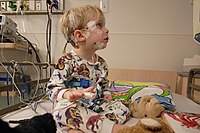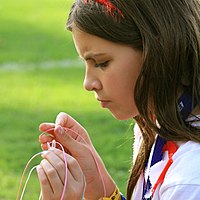
Using event-related potentials to study food-related cognition: An overview of methods and perspectives for future research
Sign Up to like & getrecommendations! Published in 2022 at "Brain and Cognition"
DOI: 10.1016/j.bandc.2022.105864
Abstract: Electroencephalography (EEG), and the measure of event-related potentials (ERPs) in particular, are useful methods to study the cognitive and cerebral mechanisms underlying the perception and processing of food cues. Further research on these aspects is… read more here.
Keywords: related potentials; event related; food; cognition ... See more keywords

Event-related potentials and neural oscillations dissociate levels of cognitive control
Sign Up to like & getrecommendations! Published in 2017 at "Behavioural Brain Research"
DOI: 10.1016/j.bbr.2016.12.012
Abstract: HighlightsThe present study applied event‐related potentials (ERPs) and investigated neural oscillations during performance of three different nested cognitive control tasks.Results demonstrated a parametric modulation of the P300 component as well as beta‐band (13–25 Hz) oscillations… read more here.
Keywords: cognitive control; control; levels cognitive; event related ... See more keywords

A systematic review of cognitive event-related potentials in mild cognitive impairment and Alzheimer’s disease
Sign Up to like & getrecommendations! Published in 2021 at "Behavioural Brain Research"
DOI: 10.1016/j.bbr.2020.112904
Abstract: This systematic review examined whether event-related potentials (ERPs) during higher cognitive processing can detect subtle, early signs of neurodegenerative disease. Original, empirical studies retrieved from PsycINFO and PubMed were reviewed if they analyzed patterns in… read more here.
Keywords: systematic review; disease; cognitive impairment; event related ... See more keywords

Tinnitus and event related potentials: a systematic review.
Sign Up to like & getrecommendations! Published in 2019 at "Brazilian journal of otorhinolaryngology"
DOI: 10.1016/j.bjorl.2019.09.005
Abstract: INTRODUCTION Tinnitus is sound perception in the absence of a sound source. Changes in parameters of latency and amplitude on the auditory event related potentials or long latency potentials waves have been cited in tinnitus… read more here.
Keywords: latency amplitude; event related; review; related potentials ... See more keywords

Event-related potentials and behavior performance scores in children with sleep-disordered breathing
Sign Up to like & getrecommendations! Published in 2019 at "Brain and Development"
DOI: 10.1016/j.braindev.2019.04.008
Abstract: OBJECTIVE To explore impaired cognition characteristics and abnormal behavior in children with Sleep-Disordered Breathing (SDB) via Event-Related Potentials (ERPs), continuous performance testing (CPT), and the Child Behavior Checklist (CBCL). METHODS A total of 108 children… read more here.
Keywords: sleep disordered; group; children sleep; event related ... See more keywords

Separating normosmic and anosmic patients based on entropy evaluation of olfactory event-related potentials
Sign Up to like & getrecommendations! Published in 2019 at "Brain Research"
DOI: 10.1016/j.brainres.2018.12.012
Abstract: OBJECTIVE Methods based on electroencephalography (EEG) are used to evaluate brain responses to odors which is challenging due to the relatively low signal-to-noise ratio. This is especially difficult in patients with olfactory loss. In the… read more here.
Keywords: based entropy; related potentials; event related; olfactory event ... See more keywords

P 141 Cerebellar impacts on neural networks of emotional attention as evidenced by event related potentials
Sign Up to like & getrecommendations! Published in 2017 at "Clinical Neurophysiology"
DOI: 10.1016/j.clinph.2017.06.213
Abstract: Background The cerebellum is highly indicative to contributions to high-order functions of emotion, supporting responsible domains of cerebral neural networks in processing of distinct emotional cues. So the impact of the attentional modes of the… read more here.
Keywords: neural networks; emotional attention; attention; event related ... See more keywords

S11-3. Three points to remember when you conduct research using event-related potentials
Sign Up to like & getrecommendations! Published in 2018 at "Clinical Neurophysiology"
DOI: 10.1016/j.clinph.2018.02.049
Abstract: Event-related potentials (ERP) are a part of the electroencephalogram (EEG) that is time-locked to a certain event, such as stimulus presentation or movement onset. As recent advances in electronics bring inexpensive and easy-to-use EEG amplifiers… read more here.
Keywords: research; three points; event related; s11 three ... See more keywords

Cognitive and motor event-related potentials in Tourette syndrome and tic disorders: A systematic review
Sign Up to like & getrecommendations! Published in 2019 at "Clinical Neurophysiology"
DOI: 10.1016/j.clinph.2018.10.022
Abstract: OBJECTIVES Tourette syndrome (TS) patients face various cognitive and motor impairments. Event-related potentials (ERP) constitute an effective way to investigate the neural correlates of those functional impairments. Various components have been assessed among TS patients,… read more here.
Keywords: cognitive motor; systematic review; motor; related potentials ... See more keywords

Applying Spike-density component analysis for high-accuracy auditory event-related potentials in children
Sign Up to like & getrecommendations! Published in 2021 at "Clinical Neurophysiology"
DOI: 10.1016/j.clinph.2021.05.007
Abstract: OBJECTIVE Overlapping neurophysiological signals are the main obstacle preventing from using cortical auditory event-related potentials (AEPs) in clinical settings. Children AEPs are particularly affected by this problem, as their cerebral cortex is still maturing. To… read more here.
Keywords: component; analysis; accuracy; event related ... See more keywords

Babies detect when the timing is right: Evidence from event-related potentials to a contingent mother-infant conversation
Sign Up to like & getrecommendations! Published in 2021 at "Developmental Cognitive Neuroscience"
DOI: 10.1016/j.dcn.2021.100923
Abstract: Social interactions are vital for healthy brain development. Burgeoning behavioural evidence indicates that a caregiver who provides contingently timed vocal responses to infant vocalisations provides key support for early language development. Understanding how contingently timed… read more here.
Keywords: mother infant; response; contingent; evidence ... See more keywords